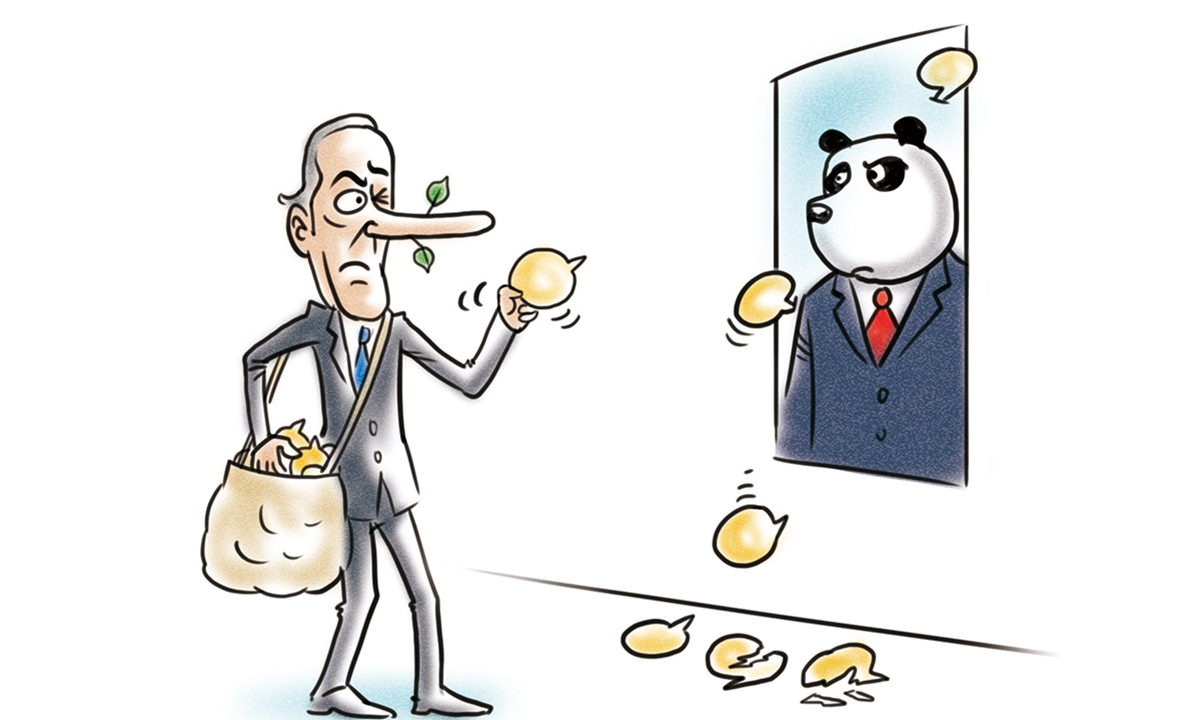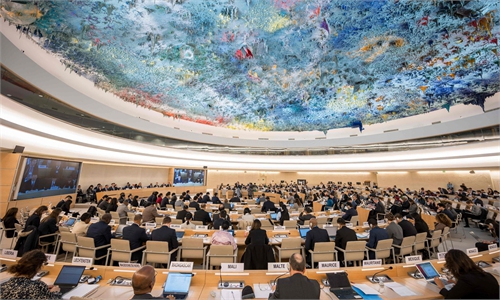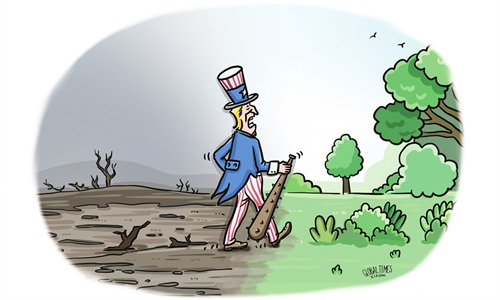
Western smear Illustration: Liu Rui/GT
At a recent session of the UN Human Rights Council (UNHRC), Volker Türk, UN High Commissioner for Human Rights, claimed there was a violation of human rights in China's Xinjiang Uygur Autonomous Region and Xizang Autonomous Region, after gently touching upon the actual massive human rights crisis in Gaza. Even worse, the Western media almost only covered his remarks on China. If there is any takeaway from this news story, it is that neither the UNHRC nor Western media have done their job properly.
Türk said he called on the Chinese government to implement the recommendations made by his office and other human rights bodies in relation to "laws, policies and practices that violate fundamental rights, including in the Xinjiang and Tibet regions." "I particularly encourage revision of the vague offence of 'picking quarrels and making trouble' in Article 293 of the Criminal Law, and I urge the release of human rights defenders, lawyers and others detained under such legislation," he added.
The title of his full speech on UN website is "Türk's global update to the Human Rights Council." Although he also raised concerns on the war in Gaza, as well as human rights issues in other countries, Western media's headlines only focused on China, with one even saying "UN rights chief says China committing violations in Xinjiang, Tibet." Some media outlets mentioned Turk's predecessor Michelle Bachelet, who released a report just minutes before her term ended in 2022, which cited possible "crimes against humanity" in Xinjiang. "But it stopped short of labelling Beijing's actions in Xinjiang a 'genocide,' as the US and some Western lawmakers have done," they noted.
Both UN high commissioners for Human Rights keep the label "genocide" at arm's length for a reason - this accusation is completely unfounded.
If a UN human rights chief ever claim there is "genocide" in Xinjiang, that act would be equivalent to imposing an unjustified charge on a permanent member of the UN Security Council. That would be a risky move - like playing with fire - in terms of the post-war international order maintained by the UN, and could lead to the organization's division, Zhu Ying, a professor at the Baize Institute at the Southwest University of Political Science and Law, told the Global Times. Blindly following the dogma of the US and the West in their pursuit of hegemony will only weaken the authority of the UN, Zhu added.
So Türk technically turned to other targets, like Article 293 of China's Criminal Law. To make a clarification first, Article 293 stipulates that "whoever commits any of the following acts of creating disturbances, thus disrupting public order," shall face legal consequence, and the acts include "beating another person at will and to a flagrant extent," "creating disturbances in a public place, thus causing serious disorder in such place" and so on.
In other words, those who have been arrested posed danger to the safety of others and social order. It is by no means a systematic human rights violations or suppression, as hinted by Türk. Kishore Mahbubani, a Singapore-based scholar and former diplomat, rebutted such Western distorted perspectives as early as 2021. "If the Communist Party of China only relied on repression to stay in power, it would not create the most dynamic economy in the world," he said.
By making those comments on China's human rights, Türk not only directly interfered in China's legislative sovereignty, but also revealed his lack of understanding of China's criminal justice system. Chinese legal experts have been constantly promoting the country's human rights protection and adjusting laws and regulations, Zhu told the Global Times.
Xinjiang and Tibet are taking the lead in key indexes of economic growth nationwide. The living standards of the people in these regions are constantly improving. The education sector has achieved high-quality development, and the issue of scarce and uneven education resources has been efficiently resolved.
Deputies and representatives from the two autonomous regions have also brought a variety of proposals to the two sessions, including ways to promote the animal husbandry, foster important supply bases for high-quality agricultural and animal husbandry products nationwide, promote local employment, further expand the scope of reimbursement for rural medical insurance for villagers, and accelerating the construction of free trade pilot zones.
The Chinese government and local authorities are sparing no effort in boosting the dynamic of the region and improving quality of life there. However, Western officials and media outlets, living in a bubble of specific ideological and Western-centric discourse system, keep shrieking their unfounded denunciations.
It is unwise and short-sighted for the UN human rights chief to target the practice of China's criminal law in order to knit some human rights accusations, Zhu said. Türk may as well pay more attention to whether Western countries have done a proper job in protecting their own human rights in practice.
More ironically, as smearing on Xinjiang and Xizang becomes increasingly blatant, the West is turning a blind eye, even indulging the violence and bloodshed in Gaza. "In 2024, any discussion of human rights violation that does not include or touches gently on Gaza, where even the UN has described as carnage, lacks credibility," Shen Yi, a professor at Fudan University, told the Global Times.


